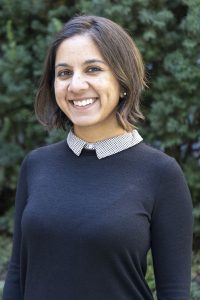Nikhita Obeegadoo joined UBC Okanagan in July 2022 as Assistant Professor in the Department of Languages and World Literatures. She is originally from Mauritius, an African archipelago in the Indian Ocean. Nikhita holds a PhD in Romance Languages and Literatures at Harvard University, as well as undergraduate degrees in Computer Science and Comparative Literature from Stanford University. Her research focuses on oceans and archipelagoes as spaces of intertwined cultural and ecological legacies.
At UBCO, she currently teaches courses on the environmental and medical humanities, as well as on francophone women’s writings. As part of her commitment to decolonizing knowledge, Nikhita’s courses foreground texts and theories emerging from various regions of Africa, South Asia and Latin America, as well as from archipelagic spaces across the world.
Dr. Obeegadoo shared some insights on her teaching and research practices.
What brought you to UBCO?
When I first saw the job posting for an Assistant Professorship in Francophone and Transcultural African Studies at UBCO, I was immediately compelled: While most of the world, including elite academic institutions, continues to view Africa as a monolith, here was a job that had the transcultural aspects of Africa embedded in its very title! It was impossible for me not to apply. Although I had never heard of the Okanagan or UBCO before, I was excited to move to a completely new part of the world, and to contribute to a young university that is still very much growing and defining itself. So, here I am!
Tell us about your research interests
My research explores how contemporary writers from the Indian Ocean and Caribbean (re)imagine the ocean as a space of simultaneously threatened cultural memory and multispecies ecology. In many literary texts, the ocean functions as an archive, that holds within itself traces of intergenerational trauma from the Middle Passage, the Kala Pani crossing, and clandestine migrations. At the same time, it is a space of rising tides and plastic pollution, that chokes out the bodies of dead dolphins on beaches only accessible to tourists. How can literature help us work through the complex ways in which past colonial violence and present environmental challenges are linked? How can it help us give shape to the various feelings, from climate anxiety to survivor’s guilt, that one might associate with the sea? And finally, how can it better equip us to respond to pressing intertwined challenges of our time, including climate change and calls for reparations?
What kind of learning experiences do offer your students?
My courses are highly interactive: We read lots of great contemporary literature about topics that are very hard to deal with, such as enslavement and incurable diseases, and we talk about and engage with these themes in a variety of ways. If students are to take away one skill from my courses, it is the ability to hold conversations about difficult and interlinked topics such as race, colonialism, gender, climate change and global health in a highly rigorous and yet deeply culturally sensitive and respectful manner. Imagine what a different place the world might be, if we did not tiptoe uncomfortably around these topics or brush them under the carpet, but instead were equipped with the tools to engage them in intellectually and ethically productive ways!
What most excites you about your field of work?
At this particular moment in history, conversations about past injustices are gaining momentum both within and beyond academia, and I am excited by literature’s potential to help us explore important questions around identity and our relationship to others. One question that frequently comes up in both my teaching and research is the following: What does it mean to “compare” experiences across different cultures? For example, multiple literary texts attempt to foster empathy for enslaved subjects by comparing their trauma to that encountered by WWII prisoners in concentration camps. How can that kind of comparison be problematic, even if it is borne from the best intentions? The classroom is a great safe space to foster these kinds of discussions, which then find their way into the real world.
Tell us about any recent awards
Last year, I was awarded a Mellon/ACLS Dissertation Completion Fellowship, which allowed me the time and freedom to conduct essential fieldwork and finish writing my dissertation. One of the most precious experiences of that time was the ability to travel to San Basilio de Palenque in northern Colombia. The Palenque began as a settlement of maroon slaves during the seventeenth century, and continues to preserve its distinct cultural and linguistic heritage, including palenquero, a Spanish-based creole. Visiting the Palenque reframed my research in an important way, from legacies of colonialism (which can be depressing to focus on) to more empowering legacies of resilience, creativity and joie de vivre in the face of all odds that enslaved peoples have bequeathed our generation. At the same time, the visit reminded me of the need to keep fighting for history to be preserved: one of the community members explained that palenquero is slowly vanishing, as people move away from the Palenque to big cities for work.
